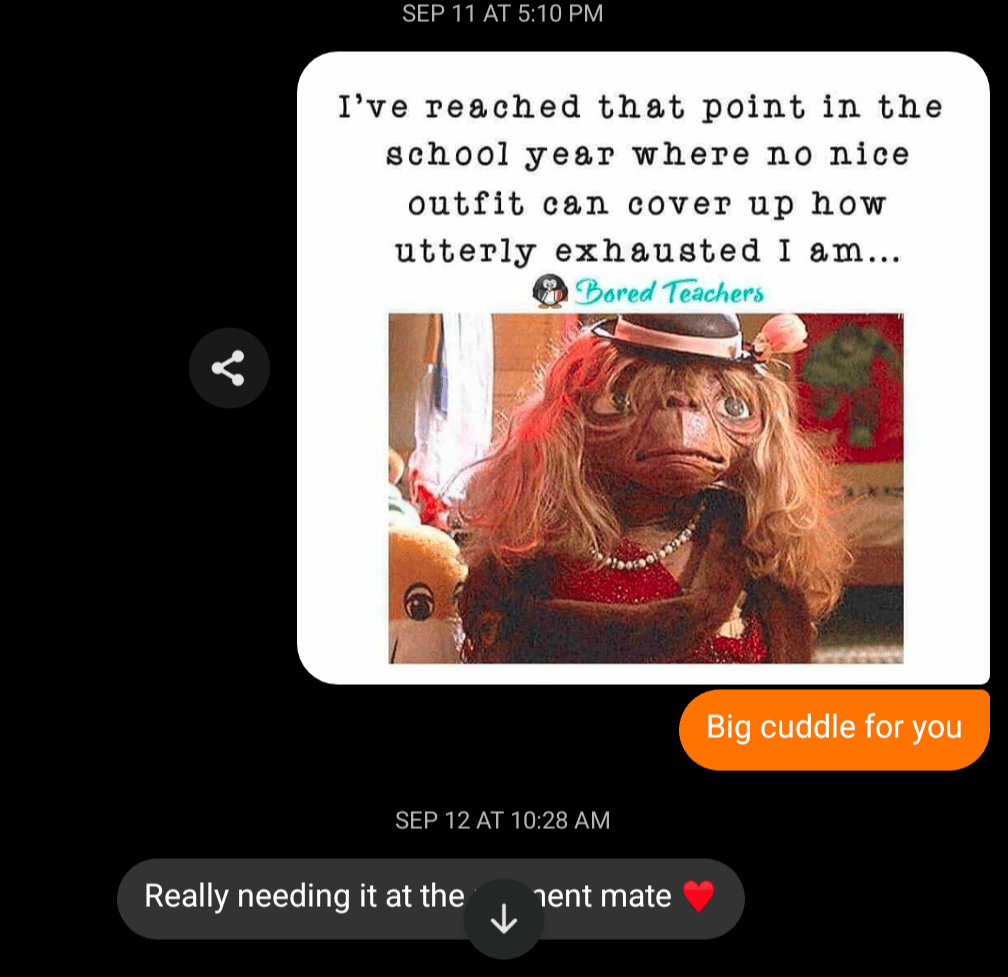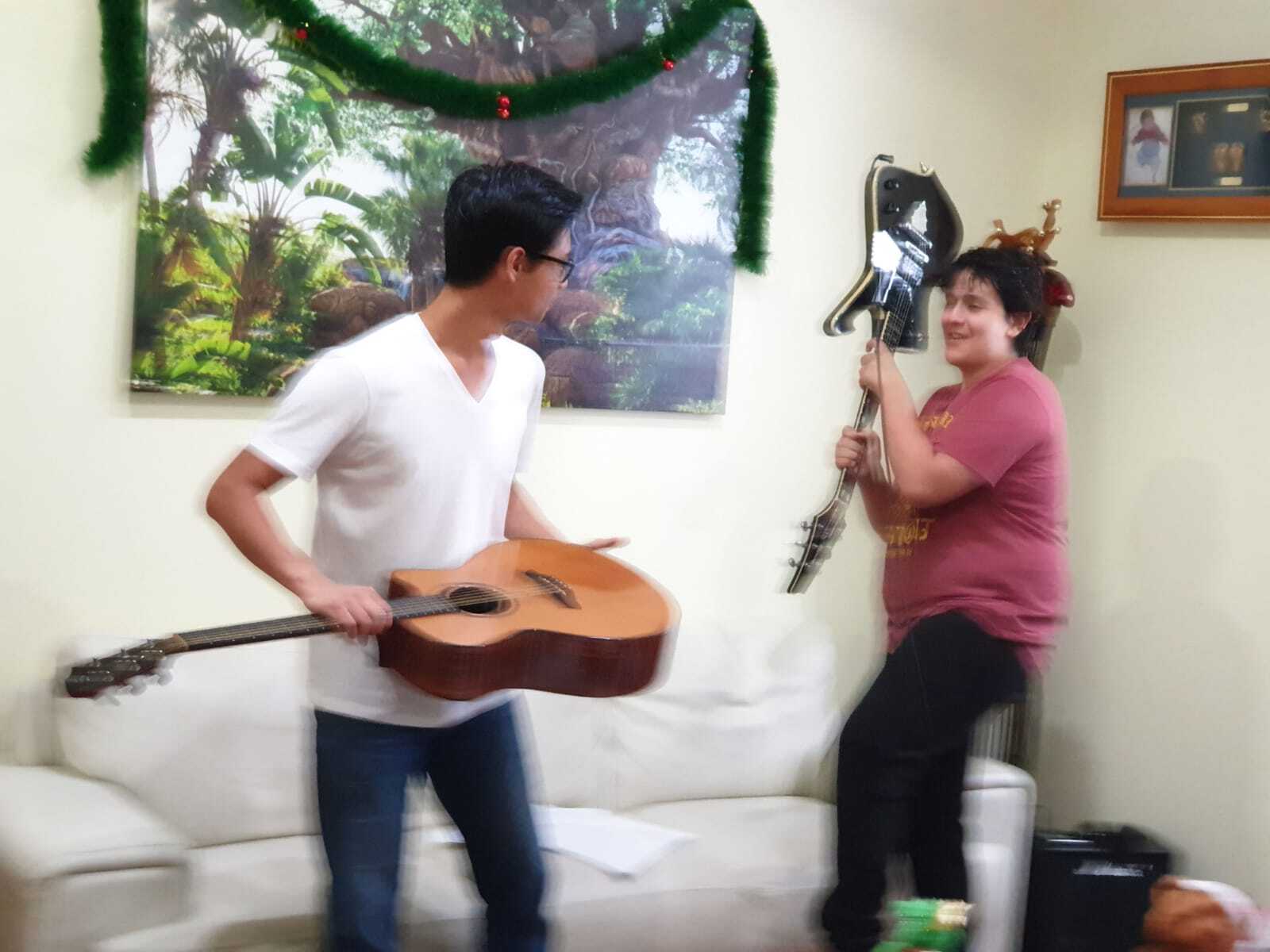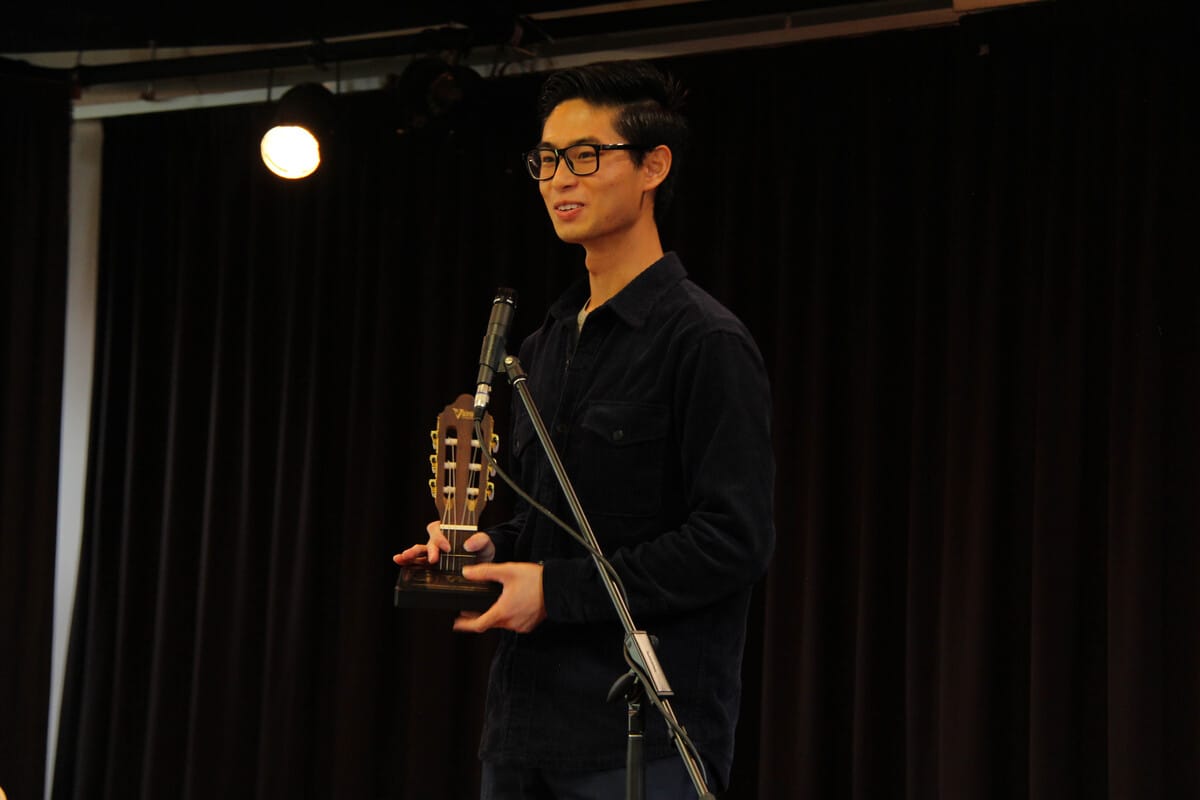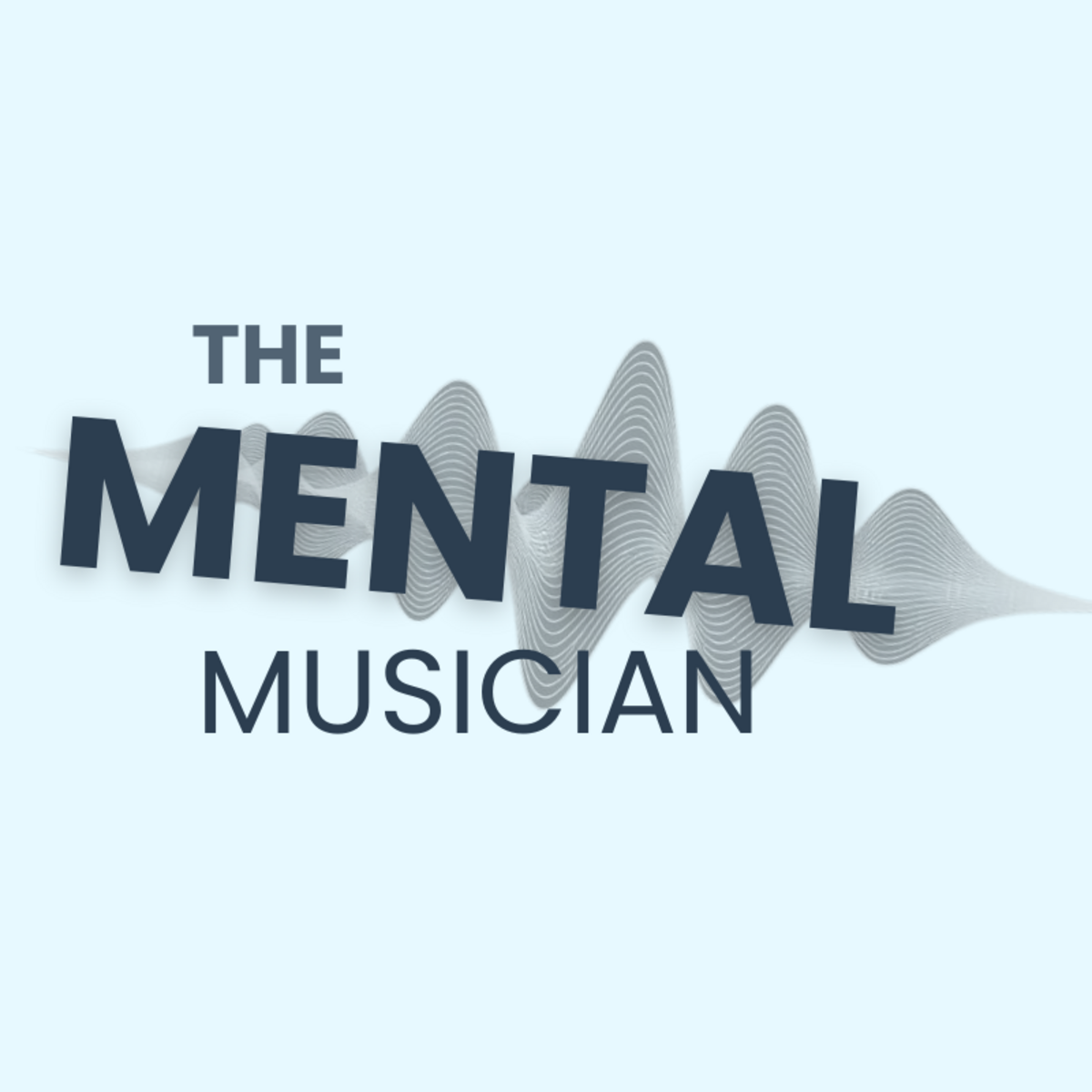You know when people say “it’s been a long year”?
I usually reply, “We all get the same 12 months as everyone else…”
That’s usually followed by a “smart arse” comment (smart ass, if you’re not from Australia).
But this year?
It’s felt more like 32 months.
When a lot happens, life has a way of stretching time.

For the last three years, I’ve been flying through a twister that just wouldn’t die down.
In my early 20s, I tried hard to ignore anything resembling long-term mental-health treatment from therapy, CBT, medication, group sessions, even honest talks with friends and family.
I told myself my music career and my guitar would be enough.
Honestly, some days I feel like I’ve forgotten what it means to be a musician.
Have you ever felt that way when life outside of music becomes so chaotic that it drowns the music itself?
I’ve written about this before in past newsletters, but after a long period of suicidal ideation, a complete breakdown, and two seizures, I’ve spent most of this year rebuilding my life. Starting again if you will.
I know many of you reading this are artists and musicians trying to do the same thing I’ve been trying to do for years — to take care of your health while still holding on to your dream.
I get that.
For a while, I thought I didn’t want the dream anymore. I wanted to walk away completely and focus on mental-health advocacy, speaking, and writing. And maybe one day I still will.
But I also want room in my life to remain a musician.
Maybe the old dream of touring the world with nothing but a suitcase, a pillow, and enough money for 7-Eleven coffee and sandwiches is a bridge too far…for now.
But what I do know is this:
I want to use music to build mental-health awareness for everyone, not just for artists.

This year was mostly about learning how to take care of myself. How to manage my mental and physical health whenever the black dog of depression shows its teeth.
And because of that, I want to share the things I learned. And the things I plan to keep trying in 2026.
The key word is try.
Because that’s all I’ve done for years.
And though I’ve failed plenty, trying is the one thing that’s kept me alive.
It’s the one thing I can control and so can you.
I’m not a therapist, clinician, or mental health scholar. I’m just someone who has lived with depression and anxiety for a decade and battled long bouts of suicidal ideation.
Some of these may not work for you. But maybe they’ll give you ideas.
And for better or worse, I think that’s why this newsletter resonates with you and others.
Because I’m not just another so-called “expert.”
I’m just a regular person figuring it out.
So here are four small changes I made in 2025, that I will continue doing in 2026 for my music and my life.
And if you ever need someone to talk to, or want to work things out, I’m just a message away — [email protected].
1. Sending a message to a friend to check in.
At least once every two days, I message a friend or family member I haven’t seen in a while. Something as simple as:
“Hey man, I hope you’re well. I just wanted to check in, see how you are. I hope everything is okay. Let’s catch up soon.”
At first I got replies like “What’s wrong?” The typical “man” response.
But gradually, my friends started opening up.
Sometimes the reply is just “❤️ thanks mate.” Or “I really needed this.”
The best part is, if it’s a guy friend, we finish our text conversation with a “love you mate.” It shows that we aren’t afraid to show each other some good ole man love. When we do finally catch up in person, we get deep, deeper than the ocean, deeper than outer space.

2. Journaling but not the way it’s usually done.
Most musicians I know journal about music. Their practice, their songs, their gigs.
And whilst this is important, it barely scratches the surfaces, and they end up hiding their real struggles behind their music. So one thing that has worked well for me is to write as if I am experiencing my life from a third person perspective.
When I was going through my darkest period of suicidal ideation, I wrote this in my journal:
“I feel like I’m just a walking shadow, and the further I walk, eventually the sun will stop shining on it, and I’ll just fade away. But if I can just keep walking, as heavy as my legs feel, I’ll walk into the sunlight and my shadow will reappear again.”
You don’t need to get poetic like that.
But writing in the third person — as if I was watching myself from outside — helped me see my life with more clarity and less judgment.
And if you’re someone who’s struggled with depression, I know you are always putting the needs of others above yours.
Journaling this way may let you extend that same empathy to yourself.
It gives you just enough distance to think more clearly — whether metaphorically or practically.

3. Keeping music as a part of my life but not be my entire life.
For most of my adult life, music was the one thing and only thing that gave my life purpose.
It was the thing that made me feel like I mattered. It was also the reason as to why I couldn’t find anything else outside of my life that was purposeful, it’s why I didn’t feel the love and compassion from my loved ones.
I only thought of myself as a musician and nothing else.
But changing this lifted a weight off my chest like the last swell of a symphony, that clean release when Darth Vader finally defeats Palpatine.
I know now I have more to offer. It’s what led me to start this newsletter and rediscover old hobbies like tennis and basketball.
Exercise is meditation for me now—not a way to run from problems, but a way to breathe through them.
So when I pick up the guitar, teach a lesson, post something, or play the odd gig, I’m not chasing perfect. I show up. If a song doesn’t get finished in one sitting, that’s fine. If a student isn’t a prodigy after one lesson, that’s fine.
But I no longer need it to prove my worth as a person. I just have to live by it.

This is why my students are music geniuses..
4. Embracing therapy as part of my routine.
I’ve been in and out of therapy for eight years, but honestly I cancelled more sessions than I attended.
Sometimes it wasn’t even the session itself I resisted, but everything before it.
Booking the time, getting out of bed, sitting in a waiting room that smelled like recycled hospital air, on carpet that looked older than me, surrounded by people who looked just as wrecked.
But here’s how I see it now:
therapy is no different than sending a check-in text to a friend.
What I say in that room, stays in that room. Whether I apply it or ignore it is up to me.
That perspective removed a lot of guilt. A lot of shame. It made it less dramatic, less heavy. And every single time I managed to show up, even when I walked in barely holding myself together, I walked out feeling a little lighter. Even if it only lasted a day.
Therapy isn’t easy, and it doesn’t solve everything. But I know this much — if I keep going, there’s a chance that things will continue to feel lighter.
And if you keep going, maybe one day that feeling will stay forever.
I have a feeling that I’ll be revisiting this in a few months time.
The thing is, you have to continually adapt how you do things so that even when you go through painful periods in life, you have a way to get through and endure.
I know that there will come a time in the future where I fall back into that place. When that time comes, I’ll have to adjust things.
For now, this is what’s helping me rebuild my life and music career.
I encourage to try using the lessons I’ve learnt, and tweak them to make them work for your lifestyle and career aspirations.
And remember I am just one DM or email away if you ever want to bounce ideas, ask questions or if you simply need someone to talk to.
I hope this helps you, more than it’s helped me.
Until next time, take care of yourself.
-Brian.

Thank you for taking 10 minutes to read today’s newsletter. It means a lot.
If you’re a long time reader and my newsletter has helped you in your mental health/music journey, please consider upgrading your subscription which costs less than two coffees.
If you decide to upgrade, I’ll reach out to you personally and add you to the Mental Musician private WhatsApp group. This is where you will get to meet other artists from around the world who share similar experiences with you, and open up about your mental health struggles in a supportive and safe environment.
You’ll also get access to my private audio archive of every newsletter — recorded by me, not an AI — plus video conversations with musicians opening up about the reality of living with depression whilst sustaining a music career.
Here’s a sneak peak at what you get, with one of my solo podcast recordings from earlier this year:
But even if you’re a free subscriber, you’re already supporting me, and I’m grateful for that.
So I’d love for you to forward it to a friend or fellow musician who might find comfort in it. The bigger our community, the more we can help artists around the world share their mental health stories and feel less alone.
📹 You can also check out my latest YouTube video where I talk about how I find ways to get through bad days:
Thanks for reading!
The Game is Changing
The internet was supposed to make it easier to build and connect. Somewhere along the way, we lost the plot.
beehiiv is changing that once and for all.
On November 13, they’re unveiling what’s next at their first-ever Winter Release Event. For the people shaping the future of content, community, and media, this is an event you can’t miss.




